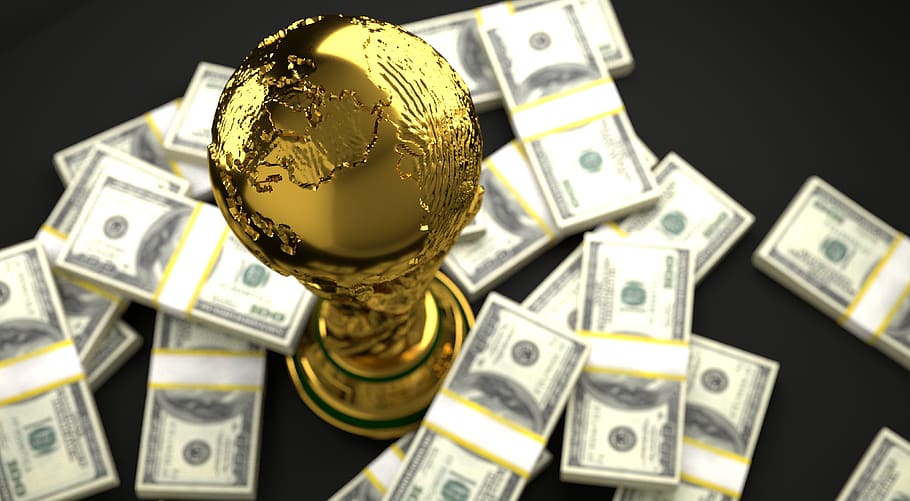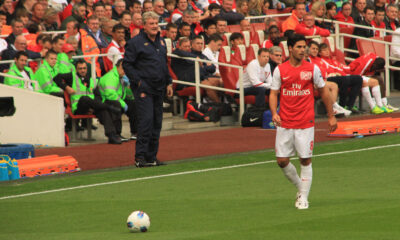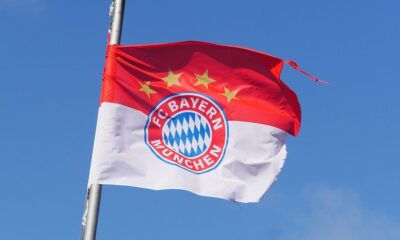Football
How Sportswashing Is Taking Over Football

Football is being used as a political tool on the international stage: The dark side of football sponsorship
Since the turn of the millennium many regimes with questionable human rights records have been using sports to improve their image to the rest of the world. This process has been called ‘sportswashing’ where a country attaches itself to a sporting event or team. When people talk about a country, they associate it with the positive message of their chosen sport.
Sportswashing was working rather well in its infancy, but perhaps the largest attempt to sportswash in history was just one step too far. When Qatar was declared as host of the 2022 FIFA World Cup, more scrutiny than ever was placed on the Gulf nation.
The Russian origins
One of the more bizarre and complex attempts at sportswashing comes from Russia, who have attached themselves to the Champions League, World Cup and multiple football teams across the world. Sponsorship of events and teams has become highly valuable with increasing TV deals to broadcast live sports. Most sponsors are companies promoting products that fans can buy. For example, the car manufacturer Chevrolet is the shirt sponsor for Manchester United, or Etihad airways sponsoring Manchester City (more on that later.)
The Russian example here is Gazprom. We’ve all seen the logo around the Champions League as one of its official sponsors for many years, and it was a key partner of the 2018 World Cup in Russia. The only issue with Gazprom sponsoring these events is that it’s not a product readily available to buy, but rather the state-owned Russian gas company.
Russia’s involvement with sportswashing can be traced back to 1999, when the then German Chancellor Gerhard Schroder announced that the country was to phase out the use of coal and nuclear energy in exchange for gas. This was music to the ears of Russia, who have the world’s largest natural gas reserves, most of which is located in the Arctic sea in gas fields controlled by Gazprom. The CEO of Gazprom is Alexey Miller, a close friend of Vladimir Putin, who in 2005 sanctioned a deal for the Russian government to become 50.23% shareholders of Gazprom becoming the majority owners of the company.
Before this deal was sanctioned in 2005, Gazprom staged the biggest takeover in Russian history when they spent $13bn to purchase the Sibneft Oil firm from the Chelsea FC owner Roman Abramovich.
Fuel for the fire
Russia has long supplied gas to countries in Europe, primarily Eastern Europe, supplying between 50% and 100% of the gas imported into countries such as Estonia, Latvia, Poland, Lithuania and more. They typically supply less gas the further west you go as they must pump it though other countries who charge them to do so. Most of the gas moved this way is pumped through Ukraine. who are well known to have a tense relationship with Russia, and charge Russia between €2-3bn each year to move its gas through the country.
Therefore in 2005 Putin developed a close relationship with Schroder and agreed to develop a new process of moving gas called the Nord Stream, a new tunnel under the Baltic Sea which would pump gas directly from Russia to Germany, cutting out the need for Russia to pay Ukraine more to funnel the increased volume of gas that would be required. Just before the German election in 2005 the two leaders signed the deal allowing work to begin. Just months later in November 2005 Schroder lost the German election to Angela Merkel. But by March 2006 he had a new job, as Chairman of the Shareholder Committee for Gazprom who was responsible for overseeing the construction of the Nord Stream.
Not long after Schroder lost office it was revealed to the media that one of his last actions as Chancellor of Germany was to agree to a secret loan of over €1bn to Russia for funding the new gas tunnel. The German media began to create links between Gazprom, Schroder and Putin which all received bad publicity, as the media began to associate the Nord Stream with corruption in the government and growing Russian influence in the country.
Russia’s solution to this issue was to change the headlines and in 2006 Gazprom announced a deal to become the sponsors of German Bundesliga side FC Schalke 04. Schalke had mounting debts and were in desperate need of a cash injection, which Gazprom happily provided. There was a deeper reason for Gazprom choosing Schalke as it’s pawn in this game, the location of the team.
Power, Politics and Sportswashing
Schalke play in Gelsenkirchen near Ruhr Valley where much of the German energy industry is based. It is also close to Rehden, where Germany store their gas supply and there are also pipelines to other European countries. As a result, local media would report favourably on Gazprom if Schalke were performing well in the league.
This wasn’t the first time that Gazprom got involved with a football team to improve PR around the Nord Stream. The year before in 2005 when the state became majority owners of the company, they purchased a controlling stake in Russian side Zenit St Petersburg. Zenit began to don the Gazprom logo on their shirts and in their stadium, and as a result of the investment into the team they have become a powerhouse of Russian football winning five league titles and the UEFA Cup since the takeover.
Zenit has become an attractive destination for many foreign stars having signed players such as Hulk, Axel Witsel, Salomon Rondon, Claudio Marchisio, Bruno Alves, Leandro Paredes and many more over the last decade. In the last few days they have been linked with Liverpool defender Dejan Lovren.
Zenit St Petersburg are interested in Dejan Lovren, according to Paul Joyce.
How much would you value the CB at? ? pic.twitter.com/beWDv45YXX
— Anfield Watch (@AnfieldWatch) July 12, 2020
In 2007 Gazprom began their sponsorship of Schalke and the media’s impression of Gazprom’s influence in Germany soon changed. They were now being praised for providing funds for the side who were struggling financially, reportedly €120m in debt at the time of the sponsorship. The gas company hosted a friendly between Schalke and Zenit to unveil Schalke’s new shirt for the first time with the Gazprom logo.
The investment in Schalke soon paid dividends on the pitch as in 2011 the side won the DFB-Pokal. The side contained players who were already or were on their way to becoming household names in world football such as Raul, Manuel Neuer, Benedikt Howedes, Julian Draxler, Joel Matip and Klaas-Jan Huntelaar.
2011 was a significant year for Gazprom as Schalke won the cup, Zenit won the Russian league title and the Nord Stream was completed as gas began to be pumped directly from Russia to Germany and was celebrated in a ceremony attended by Merkel, Schroder and many other leaders.
Schalke DFB Pokal 2011 winner celebration #SchalkeMoment pic.twitter.com/YZdITcKe63
— Elang Timur (@Miralem_Adler) May 30, 2013
Not to rest on their laurels Gazprom also announced a sponsorship deal for Serbian side Red Star Belgrade who were €25m in debt when the sponsorship deal was announced in 2010. Red Star began to wear the Gazprom logo on their shirts, once again there was an ulterior motive for the sponsorship. Russia had begun developing plans to move gas directly to Serbia with another sea pipeline, this time called the South Stream as it would operate at the opposite end of the country. This was their attempt to further cut Ukraine out of the gas funnelling industry, but in 2014 the government abandoned plans to finish the South Stream.
Gazprom has become involved with football not only in Russia, Germany and Serbia, but now worldwide. In 2012 they were announced as Abramovich’s Chelsea FC official energy sponsor. Most notably they became an official sponsor of the Champions League in 2012/13. They remain one of the competitions eight official sponsors to this day. The Gazprom logo is donned on advertising hoardings and interview boards across Europe’s premier competition. It is featured in adverts relating to the Champions League that are broadcast all over the world. The 2022 Champiosn League final will even be played at the Gazprom Arena- Zenit’s home stadium.
Confirmation that the Gazprom Arena will host the Champions League final for the 2021/22 season ?
? https://t.co/ONogsb5k1s pic.twitter.com/himrQBBteG
— FC Zenit in English✨ (@fczenit_en) June 17, 2020
Gazprom is now synonymous with top tier football without most people knowing what they offer. If you were to look at the other seven Champions League sponsors they are; The Expedia Group (hotels), Heineken (beer), Mastercard (credit cards), Nissan (cars), PepsiCo (Crisps and soft drinks), Santander (banking) and Sony (electronics) These all offer goods or services which can be purchased by a viewer of the competition, but what Gazprom is offering can only be purchased by other states. All the evidence seems to suggest that their sole purpose of being linked to the competition is to improve the way the rest of the world views Russia.
Similarly, to their involvement with the Champions League in 2013 Gazprom signed a deal with FIFA to become an official sponsor of the organisation for 2015-2018. The deal included sponsorship of the 2018 World Cup taking place in Russia. The agreement was signed by Putin, Miller, the Russian Sports Minister Vitaly Mutko and then FIFA President Sepp Blatter.
Speaking at the time of the agreement Miller said:
“Gazprom is known for its special attitude to football. We have a long and successful track record of interaction with football organizations, are an official partner of the UEFA Champions League and support football clubs in Russia and Europe. The cooperation with FIFA means for us entering a new level of world-class support to football. For Gazprom it is an important step in positioning itself as a global energy company.”
In 2019 Russia and Germany agreed to expand their relationship and build another gas pipeline between the two countries, effectively doubling the amount that could be transferred directly into the country and then spread around western Europe through the pipelines in Rehden. Adverts began to appear at Schalke games promoting the project alongside the usual Gazprom branding.
Schalke are clearly happy with their relationship with the Russians. In 2016 they agreed to a new sponsorship deal with them, worth up to €150m. lasting until 2022. This is despite Greenpeace choosing Schalke games to protest the damage Gazprom are doing in the Arctic while drilling for gas.
Reports suggest that Russia now controls 39% of the gas that is pumped into Europe and that number is only going to rise with the completion of Nord Stream 2. Their relationship with European football through Gazprom looks to be more important than ever and is clearly mutually beneficial for the Russian government and the teams it has gotten involved with. Both Red Star and Zenit were involved in the Champions League this season.
To conclude Russia and Gazprom seem to have set the guideline for other states to use football teams for sportswashing purposes. This can now regularly be seen in the Champions League when teams sponsored by state owned businesses such as Qatar Airways face a team sponsored by Fly Emirates. Sometimes states will follow the Russian example with Zenit, and outright become majority shareholders of a club, such as how Abu Dhabi used Etihad to purchase Manchester City and the subsequent City Football Group (CFG), now owning teams in Australia, Japan, and USA under the CFG umbrella.
Abu Dhabi would claim the CFG has been a successful project as the state are now linked to the success of City. They play the best football in England, have the best manager in the world and some of the world top players. None of this would have been possible without the investment from the Etihad group.
Recent damning reports about the financial dealings of City and their breach of UEFA’s financial fair play regulations put the future of this relationship at risk as. The Etihad group is being linked to financial doping rather than a successful football team. What the future holds for this relationship remains to be seen. However, City’s successful appeal to the Court of Arbitration for Sport, overturning their Champions League ban for these allegations seems to have put it to bed, for the time being anyway.
Sportswashing is nothing new, and it seems like it will not be going away any time soon either. Morally it is questionable. However, the majority of football fans want nothing more than to see their team winning trophies and playing attractive football.
However, this can now depend on if they are willing to be flexible with their morals to see this come to fruition. Some fans of Manchester City and Paris Saint Germain will clearly be happy with the regimes owning them as they have both dominated their domestic leagues. Players like Neymar, Kylian Mbappe, Sergio Aguero and Kevin De Bruyne likely would not be at playing for their current clubs if not for the owners and the finances they have invested in the teams. Others may long for the simpler days gone by, when sportswashing didn’t exist.
Manchester City's European ban lifted by CAS. Fine reduced to 10m euros. pic.twitter.com/tSraXoJF8D
— Charles Watts (@charles_watts) July 13, 2020
We hope you have enjoyed this article ‘How Sportswashing Is Taking Over Football’ What do you think about the growing influence of sponsors in world football? Let us know!
Read more on football here:
-

 News1 month ago
News1 month agoThe Best Male Tennis Players of All Time
-

 Uncategorised1 month ago
Uncategorised1 month agoWhat Dinosaur Has 500 Teeth?
-

 News1 month ago
News1 month agoThe Fastest Rugby Players Ever
-

 Football1 month ago
Football1 month agoThe Best Penalty Takers of All Time
-

 Football1 month ago
Football1 month ago10 of the most underrated footballers in the world right now
-

 Football1 month ago
Football1 month agoPlayers with the most goals in a Premier League season
-

 Football1 month ago
Football1 month agoWho is the Fastest Football Player in the World?
-

 Football1 month ago
Football1 month agoChelsea’s Possible Lineup For Next Season



















